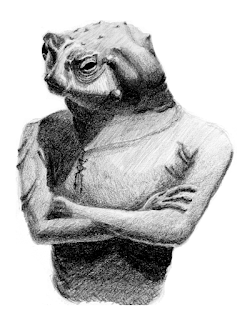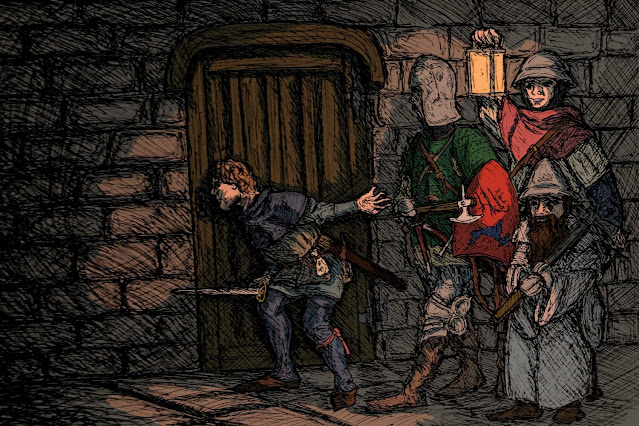Eliding Decisions: A follow up to Jared Sinclair's Rules Elide
Rules in a TTRPG remove unwanted elements for that specific game experience.
That is what Jared Sinclair's Rules Elide article is about in a nutshell (or at least what I understood of it). It is a well-written, well-exemplified article, and I suggest you read it because (a) it is great food for thought and (b) it is an idea that is hard to grasp just from my underwhelming phrase up there. You'll need the minutiae of it.
I won't replicate the work of Jared here but I think a micro example is needed before I begin on why I think Rules Elide's ideas are half-there (wherever there might be).
Example B: Character B climbs a building wall. The character sheet shows a +2 agility bonus and this character's archetype allows him to suffer only half damage from the fall in case of failure. Additionally, the character possesses a feat that grants him an additional +2 bonus if he is using at least one appropriate tool, like the shoes he bought earlier. The Referee considers all of this and what he knows is going on behind the curtain and asks for a Dexteriety (Acrobatics) skill check to beat a difficulty of 14.
In Jared's article, in a game system built to run like the example A everything is relevant, everything is important, everything must be accounted for. It’s all play.
On the other hand, a game designed to work like example B does worry about some things, but not all of them. It does not worry about which bricks the character is holding to or what safety measures he put in place (all of that is absorbed into the archetype advantage and the agility bonus), it does not worry about how the specific tool the character is using interacts with the wall surface (as long as he is using any appropriate tool the feat bonus will cover this). In this way, Jared argues rules are a tool to unfocus the game experience from the bits that the designer deems unnecessary for that game's purpose.
Rules elide decisions about the fictional world
In general terms, I agree with the idea behind rules elide. But I also think that you can push the analysis a little bit further to understand what this does to your mind as a player at the table. And by player, I mean the referee too.
What I want to say here is that, at the table, rules make you think less. Rules are a function determining what otherwise should be the task of some of the human beings around the table. It accounts for variables -or some level of them- instead of someone doing it.
Now, this is a sterile statement, devoid of any judgments. So, I'm going to judge from my personal experience, which is by no means extensible to everyone, but here it goes.
Do you want to think less at the table?
This is a huge it depends from me. I think the amount of tasks you put in the hands of the rules to feel comfortable relates to individual confidence and the group's gaming culture.
Using myself as an example, I'm highly confident without rules (ergo, thinking more or, in its less arrogant form: burdening myself with more variables to consider). After all, I'm making this stuff up so why shouldn't I know how this fictional world works?
The issue arises when any of the other participants don't agree with your considerations about the fiction, which could be handled healthily for everyone or utterly destroy the game experience. That's why no-predefined-rules FKR-style games are often referred to as high-trust games: not because you have to trust the referee will rule everything perfectly, but because these are games meant to develop in an ambiance of trustful, measured communication between sensible players.
In opposition, I think gaming groups set to an adversarial dynamic (i.e. referee v. players) would have a hard time coming to terms with the fact that a lot of things depend on the referee's thinking because players can't grasp the referee's thoughts, they are out of their control and the referee is there to kill your character.
Sometimes, the adversary is not someone else but the rules themselves. If you've ever felt there is some fictional variable you should consider but the system does not, then you end up flexing the rules to find a solution. This is fine, but it ends up in you thinking more when the rules should be making you think less.
But I'm starting to divert.
If there is one conclusion to this point is this: rules make everyone at the table think less by standardizing what is relevant to the game and making it knowledgeable to everyone in advance. This could be a wanted or unwanted outcome depending on who you are. I'm not saying thinking less at the game table is good or bad, you have to find your fitting shoe.
Rules make you think less... up to a point
I think the effect of rules making you think less is not infinite in practice.
At a none-rules level, you think a lot about the fiction so you can make rulings. With an increasing number of rules, some of those considerations are handled by the system. Then, with copious amounts of rules, the weight of the system outmatches the functions of the rules and you start thinking a lot about the rules themselves. I think you can see a lot of this in TTRPGS where you play the rules and not so much the fiction.





Comentarios
Publicar un comentario